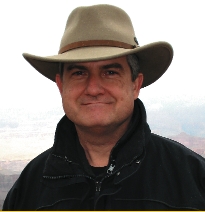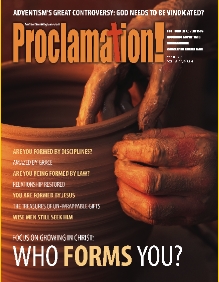
HOME / PROCLAMATION! MAGAZINE / 2014 / SPRING / SPIRITUAL FORMATION

MARTIN L. CAREY
“I am astonished that you are so quickly deserting him who called you in the grace of Christ and are turning to a different gospel.” Galatians 1:6
These were hard words for the Galatian Christians to hear. They were undoubtedly surprised by this rebuke from their leader, and although we are not told how they responded to his discipline, today we can surely learn from their situation. Since Paul’s time, believers have been in danger of turning aside from the gospel and repeating the same mistakes. Often the established church has failed to contend for the faith once delivered (Jude 1:3). The gospel and the word are continually under assault, and two millennia have not decreased the threat. For the body of Christ to stay vigilant, we must be semper reformanda, always reforming.
Today it is still appropriate to ask, “Who will hold the church accountable?” Paul, the author of this rebuke, felt he was the least personally competent for his calling as an apostle (1 Cor 15:9), yet he says all believers are either the aroma of death to those who are perishing or the aroma of life to those who are being saved. “Who is sufficient for these things?” he asks (2 Cor. 2:15-16). Even though we may be personally incompetent and untrained, as believers we are indwelled by the Holy Spirit and are commanded to guard the two pillars of the Christian faith: the integrity of the original gospel (2 Tim. 1:8-12), and the supremacy of God’s word (vs. 12,13).
Distorted gospels most often come as new light, promising reformation and growth at the expense of those pillars. False gospels have this feature in common: they add the works of man to the finished work of Christ. Whenever Christian leaders alter the core of the gospel, all those “good things” they teach about the spiritual life are shaped by that distorted core. A corrupted gospel is a leaven that spreads into the whole lump of dough.
Proclamation! magazine’s articles on spiritual formation have prompted appreciation along with some critical responses, so this is an attempt to provide clarification. Genuine Christians can disagree, but then we dig deeper into God’s word. Testing the spirits is no easy task, and it has not been reserved to the professionals. The lowliest Christians are obligated to examine the most brilliant teachers. Even Dallas Willard’s and Richard Foster’s numerous endorsements and popularity do not exempt their teachings from being subject to every Christian’s obligation, the Berean test. That is why we dare to challenge their teachings.
So here is an abbreviated summary of the problems with “spiritual formation” as taught by Willard and Foster showing how it departs from the original gospel and God’s word.
Minimize the gospel
First, Willard and Foster’s writings minimize or eclipse the core of the gospel—Jesus’ propitiation for our sins by his blood—and replace it with a gospel of human experience. Willard and Foster’s gospel is focused on what God will do in us—human experience. By this, the cross becomes an inspirational drama, while our internal experiences with God become our gospel in actual fact. For example, here is Dallas Willard’s experiential definition of the gospel: “The Gospel of Jesus is that life in the Kingdom is available to us now. We can experience the Kingdom and live in it by placing our confidence in Jesus for everything…”1 Some may argue that this definition does describe the reality of the gospel experience, but it is important to understand that this definition is not an out-of-context explanation of the gospel taken from a larger paragraph. This is Willard’s official definition of the gospel as given on the website listed in the footnote. He does not describe the gospel as the biblical, historic fact of Jesus’ finished work.
The gospel, however, is not an experience. If we use Willard’s definition of the gospel, where are we placing our trust? The gospel is the announcement of the unique, perfect work that God has already done for us in Christ (1 Cor. 15:3-19), plus nothing. If we proclaim the historical gospel of Christ’s death and resurrection and then add the process of discipleship to that gospel, we shift our focus from what Jesus has already done to our own faulty progress. In other words, holiness is not a component of the gospel; rather, it is the fruit of the gospel root.
At the heart of the gospel is the precious truth of justification by faith alone, by which we possess the very righteousness of God, without human works (Rom. 1:16,17; 5:17). We can have access and standing before God only on the basis of faith alone in Christ’s dying for our sins and rising from death, not because of our success at imitating His lifestyle. Saving faith has a mighty object outside the self: the perfections of the Lord Jesus. His righteousness is outside our experience or efforts, imputed to us as a free gift, by faith alone. If we work for it to come inside us, it is no longer a gift, but God’s obligation to us (Rom. 4:4,5).
However, Willard and Foster overlook imputed righteousness, replacing God’s acceptance of us “in the beloved” with His work of renovation within us. They insist that the traditional Protestant teaching of justification and the forgiveness of sins is just seeking a “ticket to heaven” while leaving out personal transformation.2 Willard’s sweeping condemnation of Protestantism presents a false choice between the assurance of God’s complete acceptance of us and personal holiness—a straw man argument. Instead of this false choice between assurance in the judgment and personal holiness, Hebrews makes it clear: “For by a single offering he has perfected for all time those who are being sanctified” (Heb. 10:14). Christ’s bloody sacrifice in our place is the solid foundation for our ongoing sanctification today.
The gospel of the cross of Christ is further weakened when we seek fellowship and access to God through mystical experiences—altered states of consciousness. This is the central experience of “contemplative prayer” as taught by spiritual formation teachers, such as Willard, Foster, Pennington, Merton, and others. Mystical knowledge of God separated from Scripture and the gospel of Jesus’ doing and dying makes the reconciliation of Jesus’ atonement unnecessary. D.A. Carson said it well:
To pursue unmediated, mystical knowledge of God is to announce that the person of Christ and his sacrificial work on our behalf are not necessary for the knowledge of God. Sadly, it is easy to delight in mystical experiences, enjoyable and challenging in themselves, without knowing anything of the regenerating power of God, grounded in Christ’s cross work.3
Deny Scripture’s sufficiency
Secondly, they claim the Reformation principle of sola scriptura—Scripture is God’s supremely authoritative revelation—but they deny Scripture’s sufficiency. We do not, however, need lesser authorities to supplement what the Bible may seem to lack. As Adventists, we also claimed the supremacy of Scripture, but were taught that our prophet, Ellen White, was the “lesser light that leads to the greater light.” This belief meant that, along with “the Bible alone,” we needed White’s writings as a “continuing and authoritative source of truth”4 for God’s church in the last days. For Adventists, Scripture may be “supreme,” but it is insufficient and needs a lesser authority to supplement and interpret it.
Psalm 19 asserts the complete sufficiency of God’s words for restoring our souls and making us wise (Ps. 19:7-12). The Bible claims thoroughness in teaching spiritual matters, especially the way of salvation (2 Tim. 3:15,16). “His divine power has granted to us all things that pertain to life and godliness” (2 Pet. 1:3,4).
Some readers objected that I quoted Talbot Seminary professor J.P. Moreland as an example of an evangelical leader who does not uphold the sufficiency of Scripture. The quote was from a talk he gave in 2007, discussing the problem of evangelicals’ “over-commitment to the Bible.”5 I needed to be clearer about this. Moreland is a prominent apologist who has strongly defended the Christian faith against secularism and relativism and has challenged the evangelical church’s “withdrawal from the broader world of ideas.”6 Moreland and Biola University’s faculty have stood up for Intelligent Design when other Christian universities have buckled. These are accomplishments to admire, and I also agree with Moreland that some evangelicals are anti-intellectual and too suspicious of general knowledge.
However, in his article, Moreland urges evangelicals also to accept the following as being authoritative and binding on the consciences of believers: personal words from God, mystical encounters, prophecies, tongues, etc.7 With so many voices now claiming to speak words from God, however, we are expected to discern which words are His and which are merely human noise. Moreland also believes that because the spirit world is another aspect of knowledge that is accessible to the human mind, we can benefit from the systematic study of spiritual entities outside of Scripture.8
I find these beliefs and practices to be disturbing and outside Christian orthodoxy, and for these reasons, I question Moreland’s confidence in the sufficiency of Scripture.
Foreign to God’s word
Along with such ancient mystical traditions, we also must reject religious practices that are foreign to God’s word. We declare the Bible to be insufficient when we use texts like Psalms 46:10 to support “silence and solitude” and numerous unbiblical practices of the Counter-Reformation mystics. Foster admits, moreover, that the Bible does not fully teach his disciplines, yet he insists they are essential for godliness.9 Religious disciplines are never spiritually neutral, for they carry the theology and worldview—like spiritual DNA—of their religions of origin. Non-biblical religious disciplines may transform one’s faith, but they may not do it by the word of God.
Then how are we transformed by the gospel? Jesus said, “If you abide in me, and my words abide in you, ask whatever you wish, and it will be done for you” (Jn. 15:7). It is the word of God falling on good soil (Mt. 13:23) and finding a permanent home in us that produces the fruit of faith and holiness. He sanctifies us through His truth, found only in His word (Jn. 17:17). That “word of truth” is the “gospel of your salvation” (Eph.1:13). We know those words will produce fruit because they are God’s words, which never return to Him empty (Is. 55:11). Then what has He commanded us to do?
“And this is his commandment, that we believe in the name of his Son Jesus Christ and love one another, just as he has commanded us.” (1 Jn. 3:23).
As for the early church’s example of living regular disciplines, we have these four:
“And they devoted themselves to the apostles’ teaching and the fellowship, to the breaking of bread and the prayers” (Acts 2:42). †
Endnotes
- Willard, Dallas, “Resources, WiIlard Words,” http://www.dwillard.org/resources/willardwords.asp
- Willard, Dallas, The Divine Conspiracy, p. 36,37.
- Carson, D.A. Spiritual Disciplines, Themelios, p. 36, par. 3.
- The White Estate, “The Seventh-day Adventist Church’s Understanding of Ellen White’s Authority,” http://www.whiteestate.org/issues/scripsda.html
- Moreland, J.P., “How Evangelicals Became Overcommitted to the Bible and What Can Be Done About It,” http://www.kingdomtriangle.com/discussion/ moreland_EvangOverCommBible.pdf
- Moreland, ibid.
- Ibid.
- Ibid.
- Foster, Richard, Celebration of Discipline, Harper Collins, SanFrancisco, 1988, p. 3.

Copyright 2014 Life Assurance Ministries, Inc., Camp Verde, Arizona, USA. All rights reserved. Revised May 6, 2014. Contact email: proclamation@gmail.com
 Martin L. Carey grew up as an Adventist in many different places, including Tacoma Park, Maryland, Missouri, and Guam, USA. During daylight hours he works as a psychologist for a high school in San Bernardino, California. He is also a licensed family therapist. He is married to Sharon and has two sons, Matthew, 11, and Nick, 25. He continues to pine for clear, dark skies with eight different telescopes up to 20”. Biblical research and classical piano take up his remaining energy. You may contact him at martincarey@sbcglobal.net.
Martin L. Carey grew up as an Adventist in many different places, including Tacoma Park, Maryland, Missouri, and Guam, USA. During daylight hours he works as a psychologist for a high school in San Bernardino, California. He is also a licensed family therapist. He is married to Sharon and has two sons, Matthew, 11, and Nick, 25. He continues to pine for clear, dark skies with eight different telescopes up to 20”. Biblical research and classical piano take up his remaining energy. You may contact him at martincarey@sbcglobal.net.
Editor’s note: We have received several criticisms of Martin Carey’s articles on spiritual formation and spiritual disciplines. He answers some of those concerns here.

S P R I N G • 2 0 1 4
VOLUME 15, ISSUE 1
A N S W E R I N G THE CRITICS
